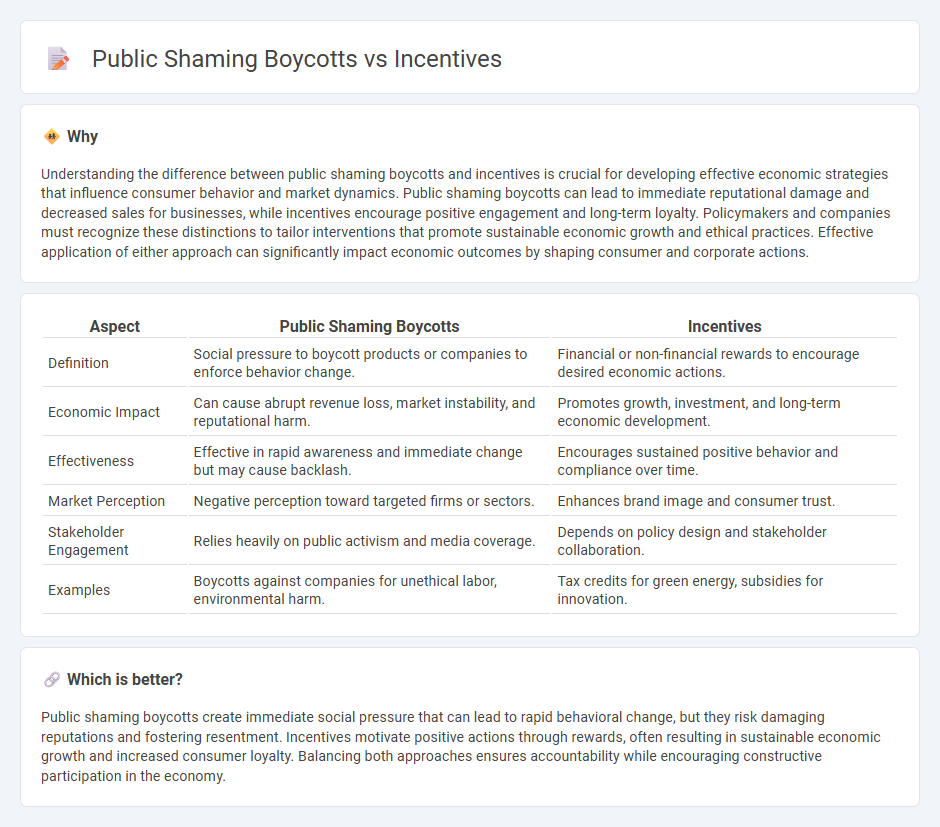
Public shaming boycotts exert intense social pressure on companies to change unethical practices, often leading to swift reputation damage and financial losses. Incentives, such as tax breaks or subsidies, motivate businesses through positive reinforcement to adopt socially responsible behaviors, promoting sustainable economic growth. Explore the comparative effectiveness of these strategies in shaping corporate conduct and market outcomes.
Why it is important
Understanding the difference between public shaming boycotts and incentives is crucial for developing effective economic strategies that influence consumer behavior and market dynamics. Public shaming boycotts can lead to immediate reputational damage and decreased sales for businesses, while incentives encourage positive engagement and long-term loyalty. Policymakers and companies must recognize these distinctions to tailor interventions that promote sustainable economic growth and ethical practices. Effective application of either approach can significantly impact economic outcomes by shaping consumer and corporate actions.
Comparison Table
| Aspect | Public Shaming Boycotts | Incentives |
|---|---|---|
| Definition | Social pressure to boycott products or companies to enforce behavior change. | Financial or non-financial rewards to encourage desired economic actions. |
| Economic Impact | Can cause abrupt revenue loss, market instability, and reputational harm. | Promotes growth, investment, and long-term economic development. |
| Effectiveness | Effective in rapid awareness and immediate change but may cause backlash. | Encourages sustained positive behavior and compliance over time. |
| Market Perception | Negative perception toward targeted firms or sectors. | Enhances brand image and consumer trust. |
| Stakeholder Engagement | Relies heavily on public activism and media coverage. | Depends on policy design and stakeholder collaboration. |
| Examples | Boycotts against companies for unethical labor, environmental harm. | Tax credits for green energy, subsidies for innovation. |
Which is better?
Public shaming boycotts create immediate social pressure that can lead to rapid behavioral change, but they risk damaging reputations and fostering resentment. Incentives motivate positive actions through rewards, often resulting in sustainable economic growth and increased consumer loyalty. Balancing both approaches ensures accountability while encouraging constructive participation in the economy.
Connection
Public shaming, boycotts, and incentives are interconnected as powerful economic tools that influence consumer behavior and corporate practices. Public shaming often sparks boycotts, pressuring companies to change unethical policies, while incentives encourage positive actions by rewarding desired behaviors. Together, these mechanisms shape market dynamics by promoting accountability and ethical standards in the economy.
Key Terms
Externalities
Incentives effectively mitigate negative externalities by encouraging positive behavior through rewards or subsidies, while public shaming boycotts aim to alter behavior via social pressure and reputational costs. Economic theories show that properly designed incentives can internalize externalities, making private costs align with social costs. Explore further to understand the balance between economic incentives and social enforcement in managing public externalities.
Behavioral Economics
Incentives leverage positive reinforcement by aligning rewards with desired behaviors, effectively motivating individuals through tangible benefits such as discounts or social recognition, as evidenced in numerous behavioral economics studies. Public shaming boycotts rely on social pressure and fear of reputational damage, using negative reinforcement to deter undesirable actions, often resulting in immediate but sometimes volatile behavioral changes. Explore deeper insights into how these contrasting strategies shape consumer and organizational decisions within behavioral economics frameworks.
Social Norms
Incentives leverage positive reinforcement to promote desired behavior by aligning with social norms, encouraging individuals to conform through rewards or recognition. Public shaming boycotts utilize negative social pressure to enforce norms by highlighting deviations and imposing reputational costs, often leading to social exclusion or economic consequences. Explore how these contrasting approaches shape social dynamics and influence compliance with community standards.
Source and External Links
What are Incentives? - peopleHum - Incentives are rewards or benefits, often monetary like pay increments, profit sharing, or stock options, offered by employers to motivate employee performance and engagement.
25 employee incentive programs to engage your team - Achievers - Employee incentive programs include social recognition, points-based rewards, referral bonuses, and professional development opportunities to boost engagement and productivity.
Incentive - Wikipedia - Incentives are motivators that alter behavior to achieve desired outcomes, commonly monetary such as bonuses and stock options; they influence effort and performance, but their effects can be complex and sometimes counterproductive without proper design.
 dowidth.com
dowidth.com